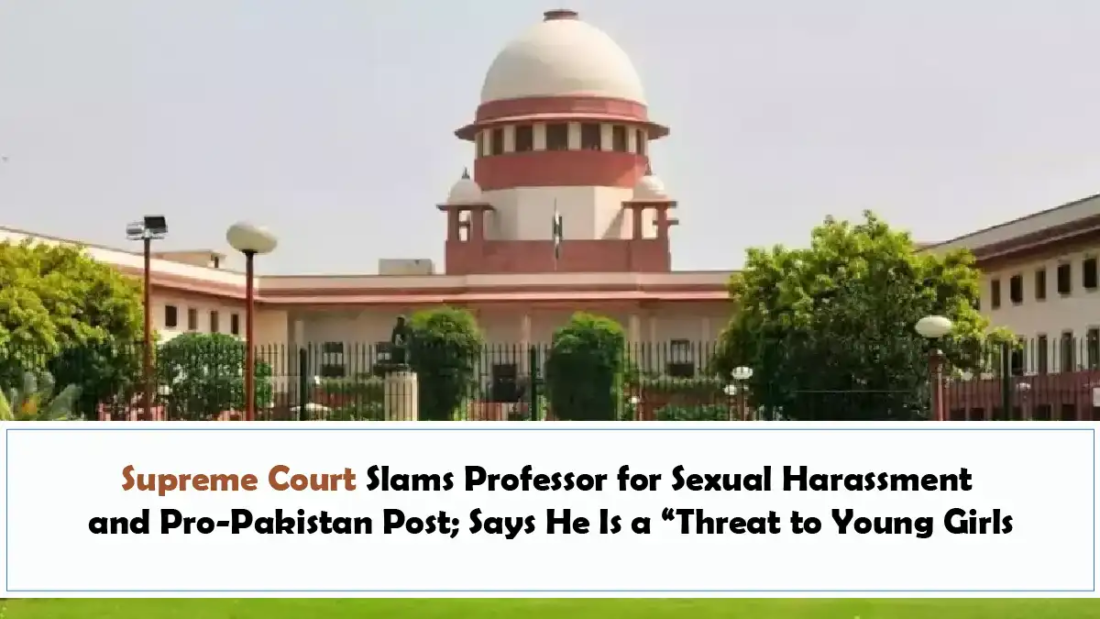Facts of the Case
The petitioner, an Assam-based government college professor named Mr. J, was arrested after posting comments on Facebook that allegedly supported Pakistan and its citizens. The post declared, “we are with the brother of Pakistani citizens… we will be with them in future also,” and further praised the President of Turkey for expressing support towards Pakistan. The post was published at a time when India’s relationship with Pakistan was strained. Following his arrest, the petitioner sought bail before the trial court, which rejected his plea on the ground that the case was at the stage of framing of charges. He then approached the Gauhati High Court, which also denied bail after observing that the petitioner’s post prima facie indicated support for Pakistan over India and reflected non-compliance with the constitutional duty under Article 51A. The High Court permitted the trial court to proceed with framing of charges and directed that the petitioner’s bail plea be considered only after the examination of at least two prosecution witnesses. Aggrieved, the petitioner approached the Supreme Court.
During the Supreme Court hearing, his counsel submitted that the petitioner is a professor who has already been suspended and has spent 179 days in custody. The State opposed bail, stating that the petitioner had two FIRs, including one under the POCSO Act, and had previously made obscene posts targeting women and children. According to the State, many posts were “difficult to read in open Court” due to their sexualised nature.
Contentions of the Petitioner
The petitioner argued that the Facebook post was removed immediately after realising that the content was inappropriate and contrary to India’s interests. He submitted that it was the only incident involving allegations of anti-national sentiment and emphasised that a chargesheet had been filed while the trial had been stalled due to the absence of a Presiding Officer since May. He further contended that he had been acquitted in one of the two FIRs previously registered against him and that the alleged conduct should be viewed as an act of “immaturity”, not wilful malice. The petitioner highlighted that he has two minor daughters and has already suffered due to prolonged suspension and incarceration.
Contentions of the Respondent (State of Assam)
The State argued vehemently against grant of bail, asserting that the petitioner had a pattern of objectionable behaviour and a history of obscene posts targeting women, girls, and even children. It submitted that one FIR under the POCSO Act was still pending and that the petitioner’s online conduct demonstrated moral unfitness and danger to the community. The State argued that he was “in the habit of misusing the internet for various activities” and that his conduct extended far beyond a single anti-national post. The State urged the Court to consider the cumulative conduct, asserting that granting bail would pose a risk to women and children, especially given his position as a college professor.
Court’s Observations
The bench of Justices Surya Kant and Joymalya Bagchi expressed strong displeasure over the petitioner’s conduct. Justice Kant directly confronted the petitioner’s counsel, stating, “You are the one who has not spared children and even matured women. You are doing all kinds of nasty things and then you make this kind of statement. You think you are above the law of the land?” Justice Bagchi, after perusing the FIR regarding obscene posts, remarked that the petitioner was “in the habit of misusing the internet for various activities.”
The bench further observed that the allegations painted a disturbing picture of the petitioner’s moral character. Justice Kant described him as having a “perverted mind” and questioned how someone with such behaviour could be permitted to teach, remarking that he “should not even be allowed to enter the college where he taught, let alone teach.” The judge added, “You are such a threat to young girls! What kind of teacher-professor you claim? [You brought] shame to the word Professor.”
The Court noted that although the petitioner argued that the post was deleted and that he had been in custody for long, the gravity of allegations especially those involving obscenity, sexual harassment, and influence over vulnerable students could not be diluted merely by asserting remorse or immaturity. However, the Court also acknowledged the procedural delays caused by the absence of a Presiding Officer in the trial court, which was contributing to the stagnation of the petitioner’s bail proceedings.
Court’s Order
The Supreme Court did not grant bail during the hearing. Instead, it directed the State to obtain full instructions regarding the status of the trial within one week. Aware of the delay caused by the absence of a Presiding Officer, the Court requested the Chief Justice of the Gauhati High Court to prioritise the matter and explore the immediate posting of a Presiding Officer in the concerned court. The bench stated: “Ld. State counsel seeks and is granted 1 weeks’ time to have instructions in this regard. In case there is no Presiding Officer, we request the Chief Justice of Gauhati High Court to take up the matter on priority basis and explore the desirability of posting a Presiding Officer at the abovementioned court without any delay.”
Thus, while expressing strong censure of the petitioner’s conduct, the Supreme Court kept the bail question open, tied to the progress of trial proceedings and further clarification from the State.
Written by Adv. Deeksha Rai
 Cart is empty
Cart is empty 

